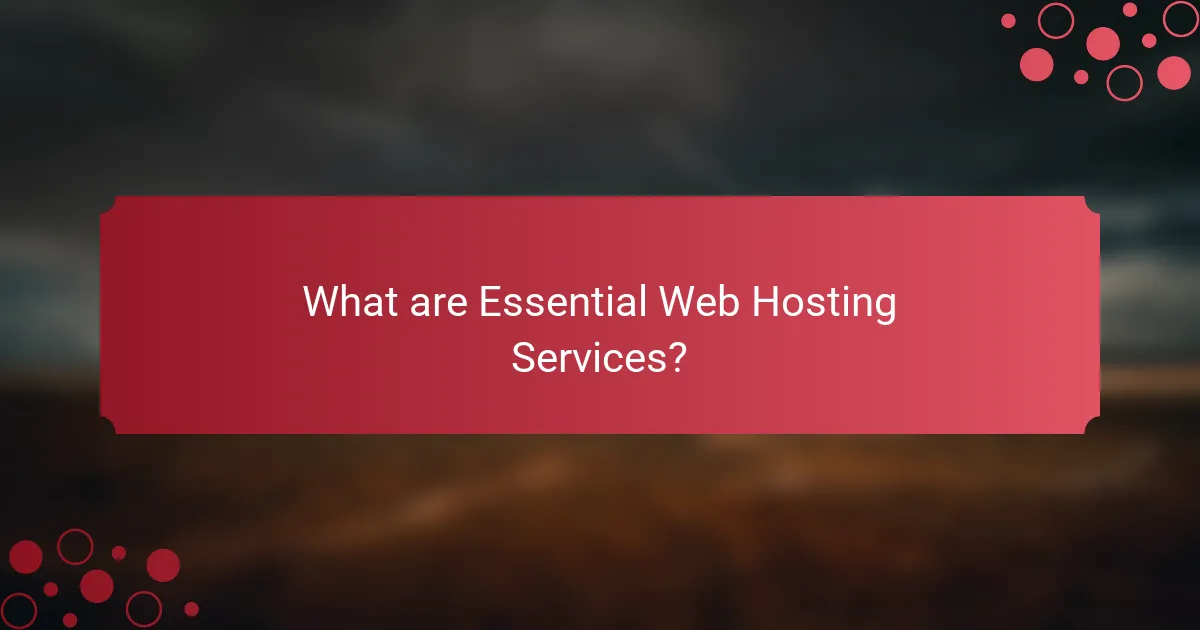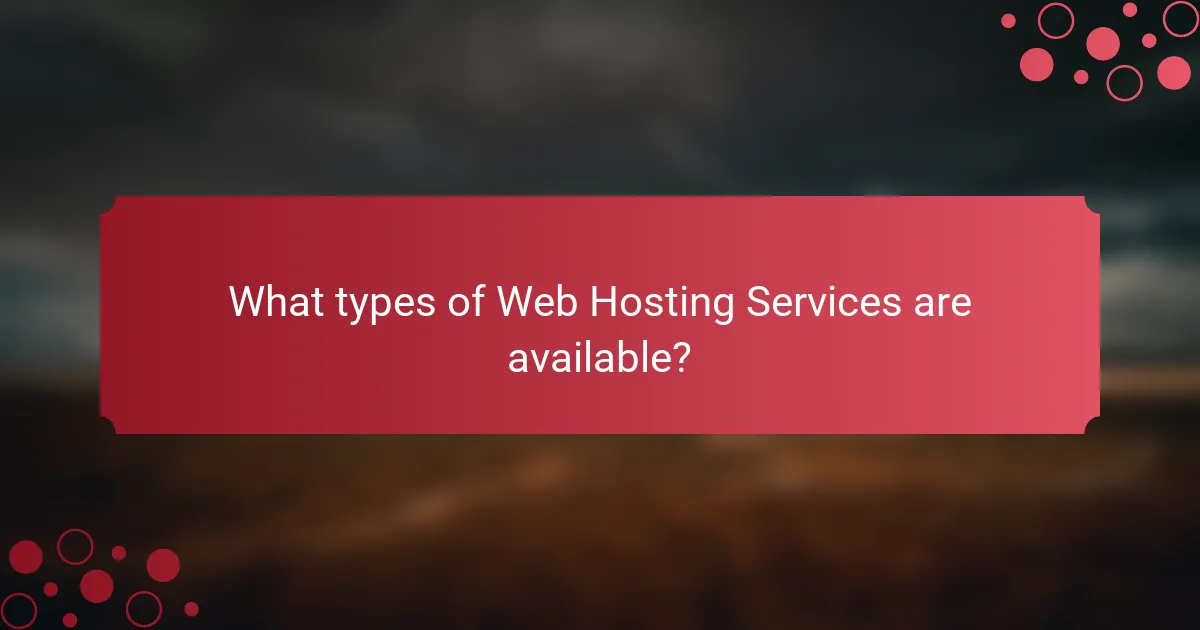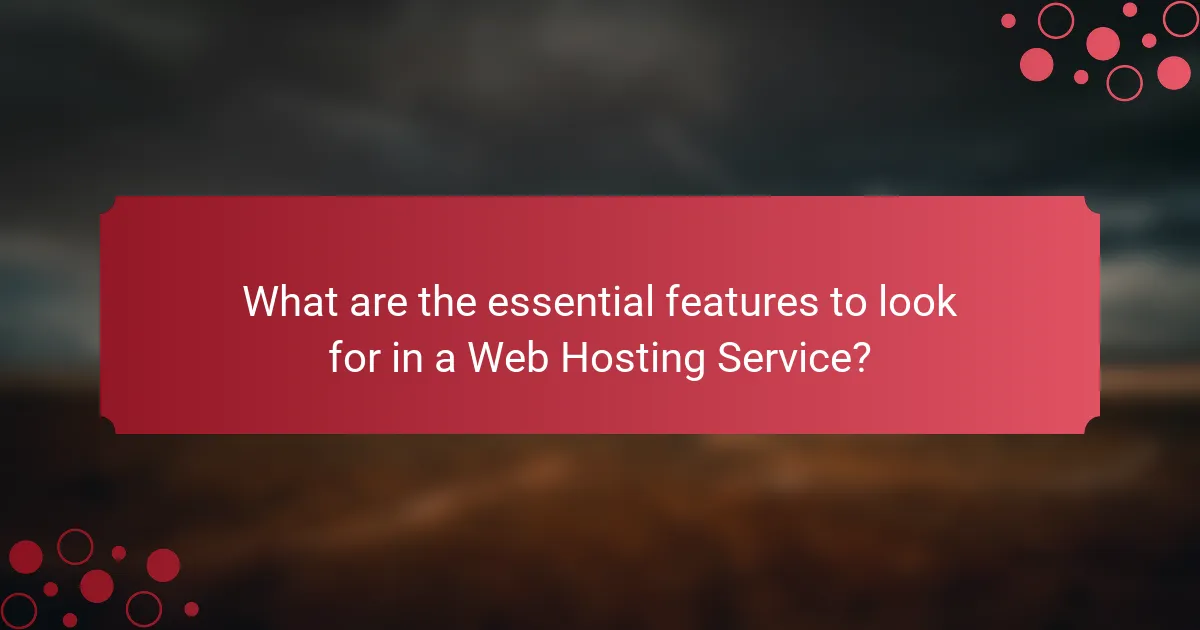Web hosting services are essential for maintaining website performance and reliability, encompassing server space, domain registration, and technical support. These services enable websites to store data, provide unique web addresses, and ensure prompt issue resolution. Various types of web hosting, including shared, VPS, dedicated, cloud, and managed hosting, cater to different needs and budgets. Key features to consider when selecting a web hosting service include uptime reliability, speed, customer support, scalability, security features, and transparent pricing. Understanding these elements is crucial for businesses looking to establish a strong online presence.

What are Essential Web Hosting Services?
Essential web hosting services include server space, domain registration, and technical support. Server space allows websites to store files and data. Domain registration provides a unique web address for easy access. Technical support ensures that any issues are resolved promptly. Other vital services include email hosting, security features, and backup solutions. These services are crucial for maintaining website performance and reliability. According to a 2021 survey by Clutch, 70% of small businesses rely on web hosting services for their online presence.
How do Essential Web Hosting Services contribute to Reliable Site Performance?
Essential web hosting services contribute to reliable site performance by providing necessary resources and infrastructure. These services ensure consistent uptime, which is crucial for user accessibility. High-quality servers and data centers enhance loading speeds, improving user experience. Additionally, features like Content Delivery Networks (CDNs) distribute content efficiently, reducing latency. Security measures included in hosting services protect against downtime caused by attacks. Regular maintenance and updates from hosting providers prevent technical issues, ensuring smooth operation. Overall, the right web hosting service directly impacts the speed, security, and availability of a website.
What are the key features of Reliable Site Performance?
Key features of reliable site performance include fast loading times, high uptime, and robust security. Fast loading times enhance user experience and improve search engine rankings. Studies show that a one-second delay can lead to a 7% reduction in conversions. High uptime ensures that the site is accessible to users consistently. Industry standards often aim for a 99.9% uptime rate. Robust security protects against data breaches and cyber attacks, which are increasingly common. Implementing SSL certificates and regular backups are essential for maintaining security. These features collectively contribute to an optimal user experience and site reliability.
How do these features impact user experience?
These features enhance user experience by ensuring faster load times and increased reliability. Fast load times reduce bounce rates and improve user satisfaction. Reliable hosting minimizes downtime, allowing users to access websites without interruptions. Features like Content Delivery Networks (CDNs) distribute content efficiently, further speeding access. Additionally, robust security measures protect user data, fostering trust. Overall, these features create a seamless and secure browsing experience, crucial for retaining visitors.
Why is choosing the right Web Hosting Service important?
Choosing the right web hosting service is crucial for website performance and reliability. A suitable web host ensures fast loading times, which can significantly affect user experience and SEO rankings. Research indicates that a one-second delay in page load time can lead to a 7% reduction in conversions. Additionally, reliable uptime is essential; many hosts guarantee 99.9% uptime, which minimizes website downtime and maintains user trust. Proper security measures provided by reputable hosts protect against data breaches and cyber attacks. Overall, the right hosting service supports scalability, enabling websites to handle increased traffic without performance issues.
What factors should be considered when selecting a Web Hosting Service?
When selecting a web hosting service, consider factors such as uptime reliability, customer support, and scalability. Uptime reliability indicates how often the service is operational. A good hosting service should offer at least 99.9% uptime. Customer support is crucial for resolving issues quickly. Look for 24/7 support options via multiple channels. Scalability allows your website to grow without requiring a complete migration. Check if the service offers easy upgrades. Additionally, evaluate the pricing structure, including renewal rates and hidden fees. Security features like SSL certificates and regular backups are also essential. Lastly, consider the server location for optimal loading speeds.
How does Web Hosting Service affect website speed and uptime?
Web hosting service significantly affects website speed and uptime. The quality of the hosting provider determines server response times. Faster servers lead to reduced loading times for web pages. Additionally, reliable hosting services ensure higher uptime percentages. Uptime refers to the time a website is operational and accessible. A good hosting service typically guarantees 99.9% uptime. This means the website experiences minimal downtime, enhancing user experience. Studies show that a one-second delay in loading time can decrease conversions by 7%. Therefore, selecting a quality web hosting service is crucial for optimal website performance.

What types of Web Hosting Services are available?
There are several types of web hosting services available. These include shared hosting, VPS hosting, dedicated hosting, cloud hosting, and managed hosting. Shared hosting allows multiple websites to share a single server. VPS hosting offers a virtual private server for more control and resources. Dedicated hosting provides an entire server for one website, ensuring maximum performance. Cloud hosting utilizes multiple servers to handle traffic and data. Managed hosting involves a provider managing the server and services for the client. Each type caters to different needs and budgets.
What are the differences between Shared, VPS, and Dedicated Hosting?
Shared hosting involves multiple websites sharing a single server’s resources. This makes it cost-effective and easy to manage. However, performance can be affected by other sites on the server. VPS (Virtual Private Server) hosting provides a dedicated portion of a server’s resources. It offers better performance and more control compared to shared hosting. Users can customize their environment, leading to improved reliability. Dedicated hosting allocates an entire server to a single user. This option provides maximum performance, security, and control. It is ideal for high-traffic websites. Each hosting type varies in resource allocation, control, and cost.
How does Shared Hosting work and what are its limitations?
Shared hosting works by allowing multiple websites to share the same server resources. Each website is allocated a portion of the server’s disk space and bandwidth. This setup reduces costs for users since expenses are distributed among all sites. However, shared hosting has limitations. Performance can suffer if one website consumes excessive resources. Security risks increase as vulnerabilities in one site can affect others. Customization options are often restricted, limiting control over server configurations. Additionally, shared hosting may not support high-traffic sites effectively. These factors make it less suitable for businesses requiring optimal performance and security.
What advantages does VPS Hosting offer for site performance?
VPS hosting significantly enhances site performance by providing dedicated resources. Each VPS operates in isolation, ensuring that performance is not affected by neighboring sites. This isolation leads to improved speed and reliability. Users benefit from customizable server configurations. This means resources can be allocated based on specific site needs. VPS hosting also offers better uptime compared to shared hosting. Studies show that VPS can achieve uptime rates above 99.9%. Additionally, it supports higher traffic volumes without degradation in performance. Overall, these factors contribute to a more efficient and responsive website.
When should you consider Dedicated Hosting for your website?
You should consider dedicated hosting for your website when you require maximum performance and control. This type of hosting is ideal for high-traffic websites. It provides dedicated resources that ensure faster load times. Businesses with specific compliance needs, such as PCI DSS, also benefit from dedicated hosting. Additionally, if your website runs resource-intensive applications, dedicated hosting is essential. It allows for customization of server configurations. Companies handling sensitive data often choose dedicated hosting for enhanced security. In summary, dedicated hosting is recommended for websites needing reliability, performance, and security.
What role does Cloud Hosting play in site performance?
Cloud hosting significantly enhances site performance. It provides scalable resources that adjust to traffic demands. This means websites can handle sudden spikes in visitors without slowing down. Cloud hosting also ensures high uptime, often exceeding 99.9%. This reliability is crucial for maintaining user engagement. Additionally, data is distributed across multiple servers, reducing latency. Faster loading times improve user experience and SEO rankings. Overall, cloud hosting optimizes site performance through flexibility, reliability, and speed.
How does Cloud Hosting enhance scalability and reliability?
Cloud hosting enhances scalability and reliability by utilizing a network of interconnected servers. This allows for dynamic resource allocation based on demand. When traffic increases, additional resources can be deployed instantly. Conversely, during low traffic periods, resources can be scaled back. This flexibility ensures optimal performance at all times.
Reliability is achieved through redundancy in cloud hosting. If one server fails, others can take over without downtime. This distributed architecture minimizes the risk of outages. According to a study by Gartner, cloud services can reduce downtime by up to 50%. This proves that cloud hosting significantly improves both scalability and reliability for web performance.
What are the potential drawbacks of using Cloud Hosting?
Cloud hosting has several potential drawbacks. One major issue is security concerns. Data stored in the cloud can be vulnerable to breaches. Another drawback is potential downtime. Cloud services can experience outages, impacting access. Additionally, costs can escalate unexpectedly. Usage-based pricing may lead to higher bills. Performance can also vary based on network connection. Latency issues may arise if servers are geographically distant. Lastly, vendor lock-in can occur. Switching providers may become difficult due to proprietary technologies. These drawbacks highlight the importance of careful consideration when choosing cloud hosting.

What are the essential features to look for in a Web Hosting Service?
Essential features to look for in a web hosting service include uptime reliability, speed, and customer support. Uptime reliability should be at least 99.9% to ensure consistent website availability. Speed is crucial; hosting services should offer fast loading times, ideally under 2 seconds. Customer support must be accessible 24/7 through multiple channels like chat, email, and phone. Scalability is important for accommodating future growth. Security features, such as SSL certificates and regular backups, protect your data. Lastly, consider the pricing structure to ensure it fits your budget without hidden fees.
How do uptime guarantees affect your website’s reliability?
Uptime guarantees directly impact your website’s reliability by ensuring consistent accessibility. A high uptime percentage, such as 99.9%, indicates minimal downtime. This means users can access your site nearly all the time. Reliable uptime fosters user trust and satisfaction. It can also improve search engine rankings. For instance, Google considers site reliability in its algorithms. Consequently, a strong uptime guarantee can enhance overall site performance. This is crucial for e-commerce and service-based websites that rely on constant availability.
What is a typical uptime guarantee offered by hosting providers?
A typical uptime guarantee offered by hosting providers ranges from 99.0% to 99.9%. Many providers advertise a 99.9% uptime guarantee, which translates to about 8.76 hours of downtime annually. Some premium services may offer guarantees as high as 99.99%, equating to roughly 52.56 minutes of downtime per year. These guarantees are often backed by service level agreements (SLAs). SLAs outline compensation for customers if the uptime falls below the promised level. This compensation may include service credits or refunds. Uptime guarantees are critical for ensuring reliable website performance. They help customers assess the reliability of hosting services.
How can downtime impact your business?
Downtime can severely impact your business by causing loss of revenue and customer trust. Each hour of downtime can cost businesses thousands of dollars. For example, a study by Gartner estimates that downtime costs companies an average of $5,600 per minute. This translates to over $300,000 per hour in lost revenue. Additionally, downtime disrupts operations and affects employee productivity. When systems are down, employees cannot perform their tasks efficiently. This leads to delays in project timelines and affects overall business performance. Furthermore, frequent downtime can damage a company’s reputation. Customers may turn to competitors if they experience consistent service interruptions. Thus, minimizing downtime is crucial for maintaining profitability and customer loyalty.
What security features should be prioritized in Web Hosting Services?
Web hosting services should prioritize security features such as SSL certificates, firewalls, and DDoS protection. SSL certificates encrypt data between the server and users, ensuring secure transactions. Firewalls protect servers from unauthorized access and potential threats. DDoS protection mitigates attacks that can overwhelm servers and disrupt services. Regular backups are essential for data recovery in case of breaches. Malware scanning detects and removes malicious software from the server. Additionally, strong password policies and two-factor authentication enhance access security. These features collectively safeguard web hosting environments against various cyber threats.
How do SSL certificates contribute to site security?
SSL certificates enhance site security by encrypting data transmitted between the user and the server. This encryption protects sensitive information, such as passwords and credit card details, from interception by malicious actors. SSL certificates also authenticate the identity of the website, ensuring users are communicating with the legitimate entity. According to a 2021 report by Google, sites using HTTPS see increased user trust and engagement. Furthermore, SSL certificates help improve search engine rankings, as Google prioritizes secure websites. Overall, SSL certificates are essential for maintaining user privacy and fostering confidence in online transactions.
What are the best practices for protecting your website from threats?
To protect your website from threats, implement strong security measures. Use HTTPS to encrypt data between the user and your site. Regularly update all software, including CMS and plugins, to patch vulnerabilities. Employ a web application firewall (WAF) to filter and monitor HTTP traffic. Utilize strong, unique passwords for all accounts and enable two-factor authentication. Backup your website data regularly to recover from attacks. Monitor your site for unusual activity to detect threats early. Conduct security audits to identify and address potential weaknesses. These practices significantly reduce the risk of security breaches and data loss.
What are some tips for optimizing your Web Hosting Service for better performance?
To optimize your web hosting service for better performance, consider upgrading to a higher-tier hosting plan. This typically provides more resources, such as CPU and RAM. Implementing a content delivery network (CDN) can significantly reduce load times by distributing content across various servers globally. Utilizing caching mechanisms, such as server-side caching, can decrease the time it takes to serve pages. Regularly updating software, including the operating system and any applications, helps maintain security and performance. Monitoring server performance with analytics tools allows for timely identification of bottlenecks. Lastly, optimizing images and other media files can reduce load times, enhancing user experience. These strategies collectively contribute to improved web hosting performance.
How can regular updates improve site performance?
Regular updates can significantly improve site performance by enhancing security, optimizing functionality, and ensuring compatibility. Frequent updates address security vulnerabilities, reducing the risk of breaches. They also introduce performance enhancements, such as faster loading times and reduced resource consumption. Moreover, updates ensure that the site remains compatible with the latest web standards and technologies. A study by Google indicates that a site’s loading speed directly impacts user retention and engagement. Therefore, regular updates contribute to an overall better user experience and improved site performance metrics.
What caching techniques can enhance loading speed?
Caching techniques that can enhance loading speed include browser caching, server-side caching, and content delivery network (CDN) caching. Browser caching stores static files locally on a user’s device. This reduces load times on subsequent visits by eliminating the need to re-download files. Server-side caching stores dynamic content generated by the server. It serves pre-rendered pages to users, significantly reducing server response times. CDN caching distributes content across multiple servers worldwide. This minimizes latency by serving content from the nearest server to the user. Implementing these techniques can lead to faster loading speeds and improved user experience.
How does choosing the right server location impact performance?
Choosing the right server location significantly impacts website performance. The physical distance between the server and end-users affects latency. Lower latency leads to faster loading times. For instance, a server located closer to users can reduce the round-trip time for data. Studies show that a 100 ms increase in latency can reduce conversion rates by 7%. Additionally, server location can influence bandwidth and data transfer speeds. Content delivery networks (CDNs) utilize multiple server locations to optimize performance. By strategically placing servers, CDNs can ensure quicker access to content. This results in improved user experience and retention.
Essential web hosting services are crucial for ensuring reliable site performance, encompassing server space, domain registration, and technical support. This article explores how these services contribute to website reliability through factors such as uptime, speed, and security. It details the different types of hosting options available, including shared, VPS, dedicated, and cloud hosting, and discusses their respective advantages and limitations. Additionally, the article highlights important features to consider when selecting a web hosting service, such as uptime guarantees, customer support, and security measures, emphasizing their impact on user experience and business performance.
